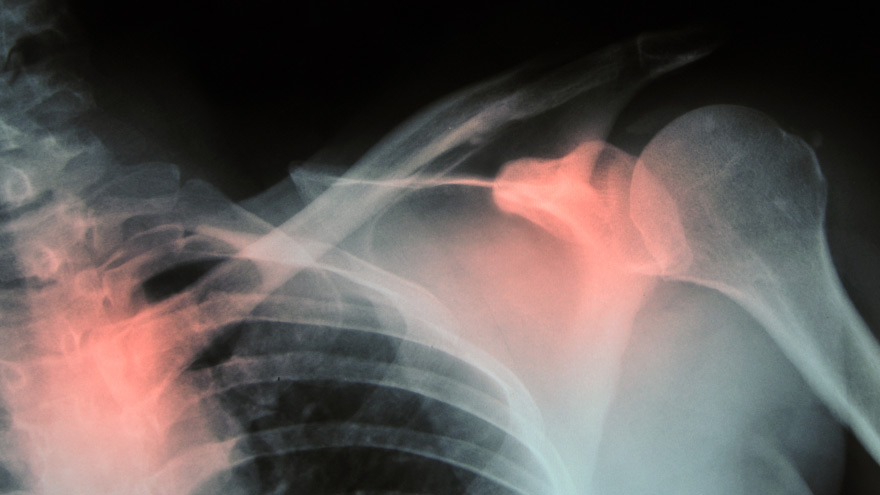Search
-
Prevent Osteoporosis: Take Control of Your Bone Health Today
Some risk factors associated with osteoporosis are out of your control. But you’re in luck, because some can be lessened by following simple tips. Below, Orthopedic Nursing Manager Katie McCarthy discusses the signs, symptoms and preventive measures. By Katie McCarthy, BSN, RN, ONC, Orthopedic Nursing Manager, Renown Health Osteoporosis is often called the silent disease, because it develops gradually for years with no clear signs or symptoms. And while some bone loss is expected as we age, osteoporosis is not a normal part of aging. So it’s important to start thinking about your bone health early. Bone is not just a lifeless scaffold for the body. It is living tissue that regenerates continually. Once we reach peak bone mass around age 25, we begin losing more bone than we produce, increasing the risk of developing osteoporosis — which literally means porous bone and points to a loss in bone density. In severe cases, normal everyday activities or movements, like hugging, can cause a fracture. After the first fracture you’re at higher risk for more, which can lead to a life of chronic pain and immobility. Bone fractures in the spine or hip are the most serious. Hip fractures can result in disability and even death — especially in older adults. Spinal fractures can even occur without falling. The vertebrae weaken to the point that they simply crumple, which can result in back pain, lost height and a hunched-forward posture. Osteoporosis: Uncontrollable Risk Factors Women are at greater risk of developing osteoporosis than men, and white and Asian women are at higher risk than black and Hispanic women. Other uncontrollable risk factors include: age; a family history of osteoporosis; certain genetic conditions; medications and medical treatments; eating disorders; a low body weight and small, thin frame; ethnicity; menopause: In fact, the lack of estrogen produced during menopause is largely responsible for a woman’s increased risk. Poor diet, tobacco use, excessive alcohol consumption, lack of exercise and an unhealthy weight also contribute to bone loss. Fortunately, those risk factors are in your control. Without symptoms, you can’t know if you’ve developed osteoporosis unless you get a bone density test or suffer a fracture. If you fall into a high-risk group, are over age 50 or have any concerns about your bone health, consult your doctor and find out if you need to be evaluated. Additionally, if either of your parents sustained hip fractures, you experienced early menopause or took corticosteroids for several months — a steroid often prescribed to relieve inflammation and arthritis — you’ll want to talk to your doctor about your bone health. If you test positive, your doctor will devise a treatment plan to match your needs, which will include lifestyle changes surrounding diet and exercise to build and strengthen weak bones. Medication to slow bone breakdown and build new bone may be prescribed, depending on the severity of your bone loss. If you’ve sustained a spinal fracture that is causing severe pain, deformity or is not responding to non-surgical treatment, your doctor may recommend surgery. Reduce Your Risk of Osteoporosis You can strengthen your bones now to prevent osteoporosis from starting. Here are some tips: Eat a diet rich in fruits and vegetables and low in caffeine, sodium and protein. Avoid soda, and talk to your doctor to make sure you’re getting enough calcium and vitamin D. Don’t smoke — it directly correlates with a decrease in bone mass. Smokers also take longer to heal from a fracture. Limit alcohol to two to three beverages per day. It interferes with the production of vitamins needed to absorb calcium and the hormones that help protect bones. Exercise three to four times each week — it’s key to healthy bones. Weight-bearing exercises like jogging, hiking and especially weight lifting build bone mass and density. There are aspects of the aging process we can’t control, but we can do something about bone loss and osteoporosis. Find out your risk, and show your bones a little TLC — you’re going to need them. This story was also published in the Reno Gazette-Journal’s Health Source on April 24, 2016.
Read More About Prevent Osteoporosis: Take Control of Your Bone Health Today
-
CEO Blog: Improving Health Through Genetics and Big Data
Renown Health President and CEO Tony Slonim, MD, DrPH, discusses efforts nationwide to develop a more effective and efficient way to deliver care. explains the benefits of Renown Health’s population health study with the Desert Research Institute and 23andMe.
Read More About CEO Blog: Improving Health Through Genetics and Big Data
-
A True Joint Effort: Exercises to Prevent Knee Pain
Experiencing knee pain during exercise or while undertaking daily activities? The knee is the largest joint in our body, so it goes without saying a lot hinges on its functionality. Here are a few exercises to help. Is exercise a real pain in the knee for you? Does getting up in the morning require a few minutes for your knees to adjust to walking around? As it turns out, knee pain is common, and it can result from injury, overuse or the breakdown of cartilage over time. Often, this pain is a result of faulty mechanics in your body, according to Jessica Ryder, a physical therapist with Renown Physical Therapy and Rehab. “We see weakness at the hips causing a lot of stresses at the knee,” she says. Exercises that Alleviate Knee Pain Try these three exercise to strengthen your glute muscles and maintain proper alignment in your knees. Hip Lift Lie flat on your back with your knees bent and feet flat against the floor. Lift your hips into the air until your body is in a neutral position, then lower your hips back down. Repeat this motion several times until you feel a gentle burn in your glute muscles. Step Down Stand with one foot on a stair or step. Slowly bend your knee and drop the other foot toward the floor. Slowly extend back up to your starting position. While doing this exercise, it’s important to move slowly, maintain control and ensure that your knee is in line with your toes. Do as many reps as needed until you feel a small fatigue in your muscles. Repeat this exercise on the opposite leg. Side Step with Exercise Band Place an exercise band around your ankles. Stand in a slight squat and then take several steps to the side until you feel a small fatigue on the outside of your hips. While doing this exercise, keep your upper body still and focus the exercise to your hips. The band will try to move your knees toward each other Repeat in both directions. Hometown Health and Renown Health are proud to be the official insurance plan and healthcare partners of the Nevada Wolf Pack. Renown Physical Therapy and Rehab | 775-982-5001 Through outpatient physical, occupational and also speech therapy, Renown Physical Therapy and Rehab gives patients hands-on, individualized treatment. Our therapists use evidence-based methods to help patients return to an active, productive lifestyle. Learn More About PT
Read More About A True Joint Effort: Exercises to Prevent Knee Pain
-
Renown Health Vision for Value Based Care
In recent years, healthcare has undergone many important transitions. One of the greatest changes has been the transition from a fee-for-service model to a value-based care model. Historically, healthcare organizations were paid for the amount of services they performed. This payment model resulted in more tests and procedures ordered, which, in turn, increased our country’s health care costs. However, now our government incentivizes health systems to provide the highest quality of care at the lowest cost possible. This new payment model is called value-based purchasing or value-based care. In this model, providers focus on delivering more coordinated and effective care. Additionally, healthcare organizations track important metrics like patient engagement, population health, and hospital readmissions. At Renown Health, we know that progress on these metrics represents real improvements in our patients’ lives. Shifting Focus from Illness to Wellness Healthcare organizations have traditionally viewed a hospital stay as the center of a patient’s wellness journey. At Renown Health, we believe a key part of our job is to help people live well every day. This means we focus not only on treating illness and injury but also on prevention efforts to keep people out of the hospital. For example, our employees help patients hazard-proof their homes to prevent falls, as falls are the leading cause of injuries in older adults. We also provide affordable health screenings to catch disease in its early stages, when it is more treatable. Renown Health also recognizes that many of the diseases our patients face – from diabetes to cancer – have social and environmental origins. We know that creating a healthier community will have a positive impact on their physical and mental health. Renown Health partners with local organizations to address community-based issues like addiction, pedestrian safety, air and water quality, climate change, and nutrition. Working together, we can lower the number of people who need care and improve the health and wellbeing of our community. Creating healthier environments and communities will help us prevent disease, which in turn will help us decrease spending and improve health. Most importantly, it will help people live up to their full potential. Dr. Slonim on Twitter | @RenownCEOTonyMD Interested in hearing more of Dr. Slomin’s thoughts on health and healthcare? Engage with him on Twitter. Follow Tony
-
My Inspiration to Keep Fighting Becoming a Grandparent
As a clinician and a cancer survivor, I know that hope is an essential force that drives people to work through difficult situations. I also believe there’s a strong correlation between hope and wellness. Hope inspires us to make healthy choices today with the understanding that these behaviors will benefit us in the future. In addition, an optimistic outlook helps patients face illness and injury with strength and confidence. While it’s easy for some people to maintain a positive outlook, it’s common to feel hopeless on a bad day. An important part of our job as healthcare providers is to help patients cultivate hope and build a strong foundation that carries them through their medical journey. The Importance of Family A common source of hope, for me and many others, is family. My family has recently welcomed our newest member, my first granddaughter, Emory. Becoming a grandparent has inspired me to reflect on the many blessings in my life. It’s not only been a opportunity to reflect, but also look ahead to the future. I often dream about the things Emory will accomplish one day, the kind of person she will become, and the world I want her to live in. These aspirations have renewed my determination to work hard and lead by example. At Renown Health, we know that hope and resilience are just as important in the recovery process as excellent medical care. That’s why we work with our patients to find sources of strength and inspiration in their own lives. We’re committed to helping our patients keep fighting the good fight for a healthier tomorrow.
Read More About My Inspiration to Keep Fighting Becoming a Grandparent
-
Beyond Jello A Healthier Approach to Hospital Food
Hospital food gets a bad rap and maybe it’s deserved. However, at Renown Health we strive to serve patients, visitors and staff meals that are both nutritious and delicious. In this video and blog post, Renown Health President and CEO, Tony Slonim, M.D., Dr.PH., FACHE, shares his thoughts on hospital food and modeling healthy lifestyles. Everyone knows that what we eat matters for almost every aspect of our health. Eating well can prevent chronic disease, control weight, improve our mood and even strengthen our bonds with loved ones as we come together to enjoy a family meal. Yet despite this knowledge, balancing work or school responsibilities, family life and everything in between can make eating healthy feel like an uphill battle. Recognizing this challenge, Renown Health invests in programming to help our community embrace healthy lifestyle habits – starting with our own employees. Knowing that people often look to their healthcare providers to model healthy behavior, we are deliberate in our efforts to help our employees and their families live well. We also provide healthy dining options in our on-campus restaurants and through our food and nutrition services team. We believe that providing nutritious, appetizing meals helps patients to recuperate from illness or injury, helps their families recharge, and helps our staff fulfill their promise of providing outstanding care. We hope that by serving as models of healthy behaviors, our employees will inspire others to join us in this journey. Dr. Slonim on Twitter | @RenownCEOTonyMD Interested in learning more of Dr. Slomin’s thoughts on health and healthcare? Engage with him on Twitter. Follow Tony
Read More About Beyond Jello A Healthier Approach to Hospital Food
-
Making Patient Safety the Priority It Deserves to Be
I am regularly amazed by medical advancements and innovation in the United States. However, even as we make significant progress in many areas of medicine, there is still much more work to be done in others. One such area is patient safety. What is Patient Safety? When we talk about patient safety, we are discussing how hospitals and healthcare organizations protect patients from errors, injuries and infections. Anyone can make a mistake at work, but in healthcare these mistakes can result in serious outcomes. In 1999, the Institute of Medicine released a report that estimated 98,000 deaths per year result from medical examination or treatment. The most recent study in 2013 suggested these numbers could range from 210,000 to 440,000 deaths per year. Many of these deaths result from preventable medical errors. This is inexcusable and shows how much more work our industry still needs to do to improve patient safety. Making Patient Safety a Priority Patient Safety is our number one priority at Renown Health. We dedicate a lot of time to establishing, reviewing, and revising our processes to prevent errors. Despite the obvious importance of patient safety, this issue is largely left to individual hospitals and health systems to manage. There is a surprising lack of national attention around this truly important issue. However, a silver lining of the COVID-19 pandemic is that it is igniting interest in hygiene and infection prevention. Patients want to learn more about the processes that are in place to prevent the spread of infections. In addition to the many protocols that guide our treatment of injuries and illness, Renown Health has implemented the following measures to prevent the spread of communicable diseases: Requiring everyone entering Renown sites to wear a mask or face covering. Establishing new processes to help patients and visitors practice social distancing. Limiting the number of visitors in our facilities. Screening all employees and patients for symptoms. Enhancing our already-thorough cleaning and disinfection processes. I hope patient safety and infection prevention remain in the national spotlight long after the COVID-19 pandemic has ended. The healthcare industry must come together to develop stronger systems and regulations to minimize preventable medical errors. We have a responsibility to our patients to do better.
Read More About Making Patient Safety the Priority It Deserves to Be
-
Bringing a Public Health Perspective to Healthcare
There are many lenses through which to view health. As you would expect, medical providers typically focus on the health of individual patients. For example, doctors consider a person’s symptoms, their current lifestyle, their past medical history, and their family’s history to diagnose medical conditions and recommend treatments. The Public Health Perspective Public health professionals look beyond the health of an individual and instead focus on the health of an entire community or population of people. They strive to achieve “the greatest good for the greatest number.” As the CEO of a health system, I feel fortunate to have education and training in both medicine and public health. As Renown Health’s leader, it is my responsibility to care for the people and communities we serve. That involves bringing world-class staff and innovative medical care to northern Nevada. We also focus on prevention by looking for ways to improve health outside of our facilities. That means partnering with local organizations to address the social, economic, and environmental factors that shape our health. Or working with local government to create policies that help to prevent disease and injury. In order to make a genuine and long-lasting impact on health, we must foster a community that helps our neighbors live well. Public health is especially important during times of crisis, such as the COVID-19 pandemic that we’re experiencing now. During these times, health systems must be able to swiftly shift focus from prioritizing the needs of individual patients to considering what is best for our local population. For example, we may need to temporarily limit hospital visitors or educate the public about how to socially distance in order to stop the spread of disease. Being prepared to make this shift and having strong relationships with our local health department and community organizations help us better serve the public. In both good times and bad, I am thankful that my public health background provides me with the perspective to look beyond our health system and embrace the health our community.
Read More About Bringing a Public Health Perspective to Healthcare
-
Combating Burnout for a Healthier Work Environment
At Renown Health, we often discuss the importance of both healthcare – how we treat people when they are sick or injured – and health – how we keep people well in their mind, body and spirit. This conversation is as important for the patients we serve as it is for our healthcare providers. It’s well known that the medical field can impose challenging and even unhealthy expectations for healthcare workers. Long hours and physically and emotionally demanding work can lead to burnout. Yet, until recently, these issues were rarely discussed openly. Because the role of healthcare providers is to care for other people, they may feel uncomfortable asking for help themselves. The good news is that more and more physicians and professional associations are talking about burnout. Hospitals are also taking action to address concerns like mental and emotional fatigue. We need our workforce to be healthy in mind, body and spirit. That’s why we support our team by educating them on the warning signs of burnout. Renown Health also trains management-level employees to care for those who need help. We encourage employees to talk openly about these challenges and encourage them to access the many services available to our employees that can help them live well. Caring for people is central to Renown Health’s mission. We believe this applies to both our patients and our teammates.
Read More About Combating Burnout for a Healthier Work Environment
-
Food as Medicine The Joy of Home Cooking
One of my family’s most cherished traditions is coming together around a home-cooked meal. From the time I was young, my family has always gathered in the kitchen, whether to prepare a meal or to catch up and share stories over a cup of coffee. Years later, I still enjoy making home cooked meals for my family. Sitting down together to share a meal is an opportunity to be present, without television or other distractions, and share what is happening in our lives. This holiday season, many of us will stay home instead of traveling in an effort to help stop the spread of COVID-19. Although we will miss seeing extended family in person, we can still choose to enjoy our favorite dishes. Since we will not have the pressure of cooking for large groups, I encourage families to consider using this year as an opportunity to teach kids (or even some adults) to prepare favorite dishes. You might even consider inviting relatives to participate in a cooking lesson via Facetime or Zoom. The Joy of Home Cooking Starts at a Young Age I feel fortunate that my grandmother taught me to cook when I was young. Nutrition plays a major role in our health, and studies show that developing home cooking skills as a young adult leads to long-term health benefits. Learning to cook teaches us how to select ingredients, prepare different types of foods, and assemble a balanced meal. Conversely, not knowing how to cook limits our food choices, causing us to rely more on ready-made foods that can contain high levels of salt or fat. Feeling kitchen confident also makes us more likely to make dinner at home instead of eating at restaurants, where people tend to over indulge. Today’s busy lifestyle can make eating together a challenge, but it’s worth the effort it takes. I encourage you to take advantage of the extra time spent at home this year by carving out time to connect over meals. Whether you make a favorite family recipe or learn a new dish together, it will be time well spent. Health Improvement Programs | 775-982-5073 Renown Health offers a number of educational and support programs to help people overcome the challenges of their health conditions and adopt a healthy lifestyle. Our team of registered dietitians and nurses also work to provide patients and their loved ones the tools to manage disease and live a healthy and happy life. We Offer: Diabetes Programs Medical Weight Management Nutrition Programs Learn More
-
Improving the Way we Deliver Quality Rural Healthcare
One of the most pressing issues in modern medicine is the need to improve rural healthcare. This challenge hits particularly close to home, as Renown Health is the only provider covering 100,000 square miles in northern Nevada, an area that’s mostly rural. People in rural areas suffer from chronic diseases such as heart disease, cancer and respiratory disease, at higher rates than the general population. One of the largest contributors to these health disparities is a lack of access to health services. Many rural communities have fewer providers and care facilities. This forces residents to travel farther to receive preventive care and medical treatment. We must identify ways to better support the health needs of the millions of Americans who live in rural communities. Ideas for improving rural healthcare Health systems must identify innovative ways to leverage existing resources and new technologies to care for patients in these communities. For example, telehealth can help diminish a person’s need to travel long distances to receive specialty care. Similarly, online classes can help educate patients about preventive behaviors. Remote monitoring technology also allows patients to track their health conditions from home. Additionally, we can address physician shortages by empowering health professionals such as nurse practitioners, physician assistants and technologists to care for patients. These providers receive excellent training and have demonstrated success in improving health outcomes. Renown Health cares for people from diverse backgrounds and we are dedicated to caring for patients in every community we serve. Renown Telehealth We’re leading the region in using video conferencing technology to provide the best care possible – no matter where you are. Renown Telehealth is telemedicine that gives you access to top-level care and better outcomes with less stress and fewer travel costs. Learn More
Read More About Improving the Way we Deliver Quality Rural Healthcare
-
How Philanthropy Helps Address Gaps in Care
In Nevada, we are so fortunate to have a number of not-for-profits and philanthropists who are supporting our mission at Renown Health; we couldn’t do it without them. In the world of healthcare, we are doing well in driving community benefit programming through operations. However, the things our communities need investments in are so much broader than we might be able to afford on our own. That is why it is essential for us to be supported by the people who are so in love with this community and want to assure we get the kinds of services and care for those who can’t afford it or add new services that are contemporary and leading edge that have not been offered here before. Establishing Behavioral Health & Addiction Institute We are so excited to receive a very generous donation from Chuck and Stacie Mathewson for the Stacie Mathewson Behavioral Health & Addiction Institute. This institute is so sorely needed in northern Nevada. Renown Health has a very important role in being able to bring attention to this important problem of mental health and addiction challenges in northern Nevada. Keeping Pediatric Care Close to Home One of the most important areas where philanthropy comes in handy for us at Renown Health is by assuring that we have the foundational programs that we would not be able to afford with operations alone. For example, the William N. Pennington Foundation’s generous gift has allowed us to create 15 pediatric specialty areas here in northern Nevada so children who have an illness or injury no longer need to leave town. The William N. Pennington Foundation supported Renown Children’s Hospital in a way that we never would have been able to support on our own. We are eternally grateful, and their gift — that 100,000 children are assured access to contemporary health and healthcare services — is beyond comprehension.











